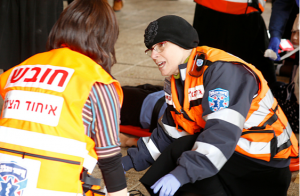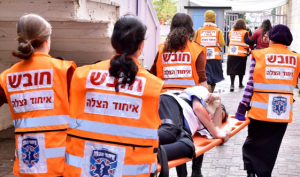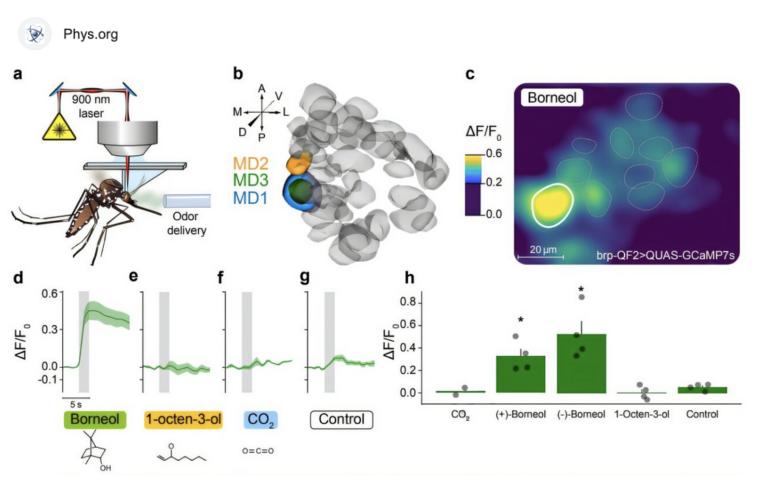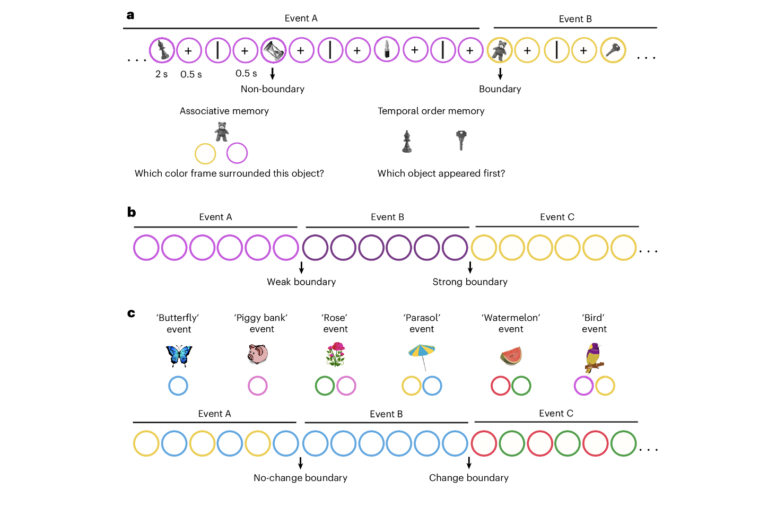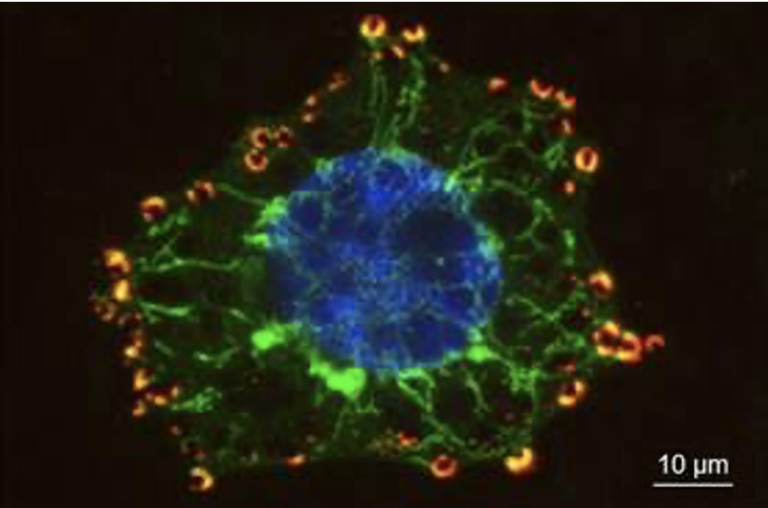Terrorisme : former les israéliennes, notamment orthodoxes, à la médecine urgentiste

[:fr]
En Israël, 89 femmes, dont beaucoup proviennent de communautés ultra-orthodoxes, ont participé au tout premier exercice d’évacuation massive de blessés (MCI). Elles ont récemment terminé leur formation EMT (Emergency Medical Technician) dans plusieurs régions du pays. Elles se sont retrouvées à Jérusalem mardi dernier pour un exercice qui simule une attaque terroriste de masse sur un lycée de jeunes filles, organisé sous la supervision de formateurs certifiés, de paramédicaux et de médecins de United Hatzalah. 59 personnes ont été maquillées comme des blessées, et pour donner plus de réalisme à la scène, des sirènes, des cris enregistrés, des feux clignotants et des machines à fumée accompagnaient l’exercice.
United Hatzalah regroupe plus de 3000 volontaires à travers tout Israël qui interviennent 24 heures sur 24, 7 jours sur 7, 365 jours par an.
Batsheva Soussan, récemment diplômée en EMT témoigne : « L’exercice a été bien orchestré et nous a permis de percevoir concrètement ce qu’est un accident de masse. Pour la première fois, nous avons pu voir les différents acteurs EMS (Emergency Massive Response) travailler ensemble sur une même scène. Ce fut surprenant de voir des femmes d’horizons et milieux très différents et des spécialistes EMS se réunir pour mieux sauver des vies. Le sentiment de participer à une démarche commune pour le bien de tous prévalait chez toutes les femmes, comblant les clivages religieux et sociaux. Beaucoup de femmes venaient de milieux très religieux. C’était fascinant de voir ces femmes très religieuses s’extraire de leurs responsabilités domestiques ou professionnelles pour se projeter dans un autre univers. Cela illustre comment chacun d’entre nous peut sortir de ses propres zones de confort et amener quelque chose de différent dans sa propre communauté« .
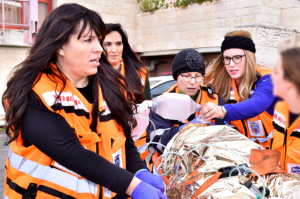
Batsheva Soussan a commencé à travailler chez United Hatzalah après avoir entendu des histoires de sauvetage, elle a compris qu’elle voulait aussi devenir une EMT. « Une fois l’un de nos formateurs a aidé une mère à sauver son propre enfant à distance. Cela m’a beaucoup ému et j’ai su que je voulais devenir une EMT pour sauver des gens. Je suis très reconnaissante envers cette organisation qui permet aux femmes de rejoindre les rangs des volontaires qui sauvent des vies chaque jour. Elles nous permettent d’apprendre en tant que femmes, de nous entraîner ensemble et de travailler ensemble en petits groupes ou seules, selon nos propres horaires, en tant que bénévole. »
Une autre participante, Bracha Zicherman, raconte : « Cet exercice a été le premier avec des personnes et non des poupées. Lorsque vous voyez une personne avec un couteau sortir de la tête, même si c’est un faux couteau et un maquillage professionnel, vous avez un sens du réalisme qui n’est pas présent dans les cours de formation, aussi professionnels soient-ils. Lorsqu’une femme souffre d’une lésion thoracique ou d’une blessure qui affecte son système reproducteur, c’est aussi plus confortable et moins intrusif pour elle d’être traitée par une autre femme ».
Pour Bracha Zicherman, seules des femmes EMT peuvent s’occuper de femmes dans certaines circonstances, «lors d’accouchements, les femmes préfèrent préserver leur intimité. Un jour, nous aurons assez de femmes EMT que nous pourrons envoyer soigner des femmes pour des urgences médicales. Cela nous permettra de diminuer les traumatismes« .
L’exercice a été organisé par Gitty Beer, récemment diplômée EMT, épouse du fondateur et président de United Hatzalah, Eli Beer. Gitty Beer explique « qu’elle a organisé l’exercice pour mieux préparer les EMT fraîchement diplômées au pire scénario possible ». Selon Eli Beer, « mon épouse est devenue de facto le chef de ce qui va devenir la division femmes de l’organisation, en se concentrant sur les femmes fournissant une assistance médicale d’urgence à d’autres femmes. Dans cet esprit, l’exercice était dirigé par des femmes et uniquement par des femmes« .
Gitty Beer ajoute : «Nous avons formé quatre groupes de femmes récemment diplômées, qui ont toutes terminé leurs formations EMT au cours des derniers mois. Les cours, dont certains ont été parrainés par l’organisation de femmes Lions of Judah, ont été mis en place afin de permettre aux femmes qui voulaient apprendre à sauver des vies de pouvoir le faire dans un environnement confortable et «casher», de construire des liens d’amitié et de camaraderie avec d’autres femmes semblables », a expliqué Gitty Beer. «Nous savons tous que les urgences médicales peuvent être terriblement stressantes et dangereuses. Notre souhait est d’éliminer autant que possible ce malaise ressenti par les femmes. Les gens sont déjà dans un état vulnérable en cas d’urgence, nous visons à minimiser ce stress supplémentaire. Je suis très satisfaite de la participation pendant l’exercice et des résultats ».
« Le nombre important de personnes impliquées dans l’exercice, et le professionnalisme dont chacune d’elles a fait preuve, était spectaculaire. Beaucoup de femmes ne faisaient pas de service militaire ou national en raison de leur mode de vie religieux. Beaucoup estiment qu’il leur manque quelque chose en dehors de leur famille ou de la vie professionnelle pour les autonomiser. Pendant les cours, elles apprennent les compétences nécessaires pour sauver des vies. Ces compétences peuvent les motiver et les aider à devenir plus sûrs d’elles-mêmes dans leur vie personnelle et dans leur propre communauté. C’est gagnant-gagnant pour tout le monde. Les femmes reçoivent les connaissances et la capacité d’aider leurs communautés, les communautés reçoivent des soins médicaux supplémentaires et les patients reçoivent des soins médicaux plus rapides et moins intrusifs de soignants partageant les mêmes idées qui sont maintenant formés EMT. Ce projet est idéal pour les femmes de toutes les communautés, qu’il s’agisse de soignants ou de patients. En fin de compte, ce sont les patients qui sont prioritaires. Ce sont eux qui bénéficieront le plus de ces types de formations », conclut Gitty Beer.
Traduction/adaptation Esther Amar pour Israël Science Info
[:en]89 women participated in what was the first ever all-female mass casualty incident (MCI) drill of its kind in Israel. The women, many of whom are from different Ultra-Orthodox communities in Israel, recently finished EMT training courses in different parts of the country. They joined together in Jerusalem on Tuesday for a combined drill which simulated a massive terror attack on a girl’s high-school, arranged under the oversight of certified United Hatzalah trainers, paramedics and doctors. The drill included 59 “injured” persons who were professionally made up to appear as wounded individuals, sirens, recorded screaming, flashing lights and smoke machines that were employed to give a sense of realism to the scene.
Batsheva Soussan, one of the newly graduated EMTs and a participant in the drill, spoke about her experience. “The drill was well orchestrated and allowed us to get a first -hand feeling of what a mass casualty incident is like. For the first time we, the new graduates, were able to see all of the different levels of EMS responders working together at the same scene. For me, it was empowering to see this many women from different walks of life, with different backgrounds and EMS specializations coming together to get better at saving lives.”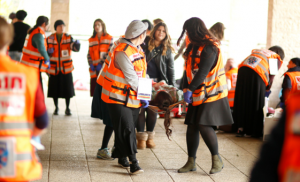
Soussan explained that the unifying interest of life-saving, that was prevalent with all of the women, bridged religious divides as well as social ones. “Many of the women who were there today come from very religious backgrounds. It was inspiring to see them be able to step out of their responsibilities at home and their places of work to do something that was truly meaningful for them. This exemplifies how each of us can step outside of our own comfort zones and make a difference in our own community.”
Soussan got her start working in United Hatzalah a while back, and having seen the effect of the life-saving stories occurring around her, knew deep down that she too wanted to become an EMT. “There was a situation when one of our dispatchers helped a mother save her own child that was choking. That story showed me how a person can help even from afar. It really moved me and I knew that I wanted to become an EMT and save people as well. I am very thankful to this organization, which is a religiously minded one, for giving women a place to learn and join the ranks of the volunteers who save lives every day. They allow us to learn as women, train together as women, and work together in small groups or on our own, according to our own schedules. I don’t think that I could do training shifts on an ambulance per se, but being a community-based emergency responder on my own is something that I could certainly do, and that I want to do. The style of responding that the organization is based upon is something that allows me the freedom to volunteer, as I am needed.”

Another participant, Bracha Zicherman was also inspired to become an EMT due to seeing the effect of the community-based responders all around her. “I see how much of a difference EMTs make in our community and I knew I wanted to help, as I have a lot to give.”
Zicherman added that for her, the drill made the information that the women had learned in the course come alive. “The drill was the first experience in treating people and not dolls. It became real for me, that this is something that I will now be doing to help people. When you see a person with a knife sticking out of their head, even if it is a fake knife and professional make-up, you get a sense of realism that isn’t present in training courses, no matter how professional they are. While the drill by nature is a drill of chaos, the trainers ran it perfectly and it really brought home the message that we will be out there helping people very soon.”
Zicherman also added that the nature of the drill, allowing women to participate in a setting that was specifically designed for them, was empowering for her. “For most of us, this is a huge step forward. There are many issues involved when men treat women during a trauma scene. When a woman has a chest injury or an injury that affects her reproductive system, it is both more comfortable and less intrusive for a woman to be treated by another woman. Imagine a woman who has never even uncovered her hair in front of a man to suddenly be stripped by a male EMT. The scenario simply adds trauma of a different sort to the injury.
Zicherman imagines a time when only female EMTs will be sent to treat women suffering from medical emergencies. “In situations such as childbirths and other cases where women would prefer privacy having a woman treat the patient, it is especially important for the woman who is at her most vulnerable moment. I look forward to the day when we will have enough female EMTs that we will be able to send only women to treat women during medical emergencies. This will allow us to lessen the traumatic experience for the female patients,” she said. “This course and this drill were definitely steps in the right direction.”
The drill was organized by recently graduated EMT Gitty Beer, who is also the wife of the Founder and President of United Hatzalah, Eli Beer. Gitty said that she organized the drill to better prepare the newly minted EMTs for the worst possible scenario that they may ever have to face. According to Eli, Gitty has become the de facto head of what looks to become a women’s division of the organization, focusing on women providing emergency medical assistance to other women. In line with that thinking, the drill was run by women and for women only.
“We combined four groups of recently graduated women, all of whom completed their EMT training courses within the past few months. The courses, some of which were sponsored by the Lions of Judah women’s organization, were put in place in order to allow women who wanted to learn how to save lives to be able to do so in a comfortable and “kosher” environment, all while building bonds of friendship and camaraderie with other like-minded women,” explained Gitty. “We all know that medical emergencies can be terribly unnerving and very exposing. Our hope is to eliminate as much of the discomfort felt by female patients as possible. People are already in a vulnerable state during an emergency, we are aiming to minimize that.”
Gitty added that she was very pleased with the turnout during the drill and the results.
“The sheer quantity of people involved in the drill, and the professionalism that each of them portrayed, was simply spectacular. Many of the women did not do military or national service due to their religious lifestyle. Many feel that they are lacking something outside of their family or professional life that can empower them. During the courses, they learn the skills needed to save lives. These skills can motivate them and help them become more self-assured in their personal lives and in their own communities. They learn the skills, and then they turn around and help out their own community. It is a win-win for everyone. The women receive the knowledge and capability to help their communities, the communities receive extra medical care, and the patients receive faster and less intrusive medical care from like-minded caregivers who are now trained EMTs. This project is great for women of all communities, whether they are caregivers or patients. But at the end of the day, it is the patients who we need to keep in the forefront of our minds. Their needs come first, and they are the ones who will benefit the most from these types of courses,” concluded Gitty.[:]

